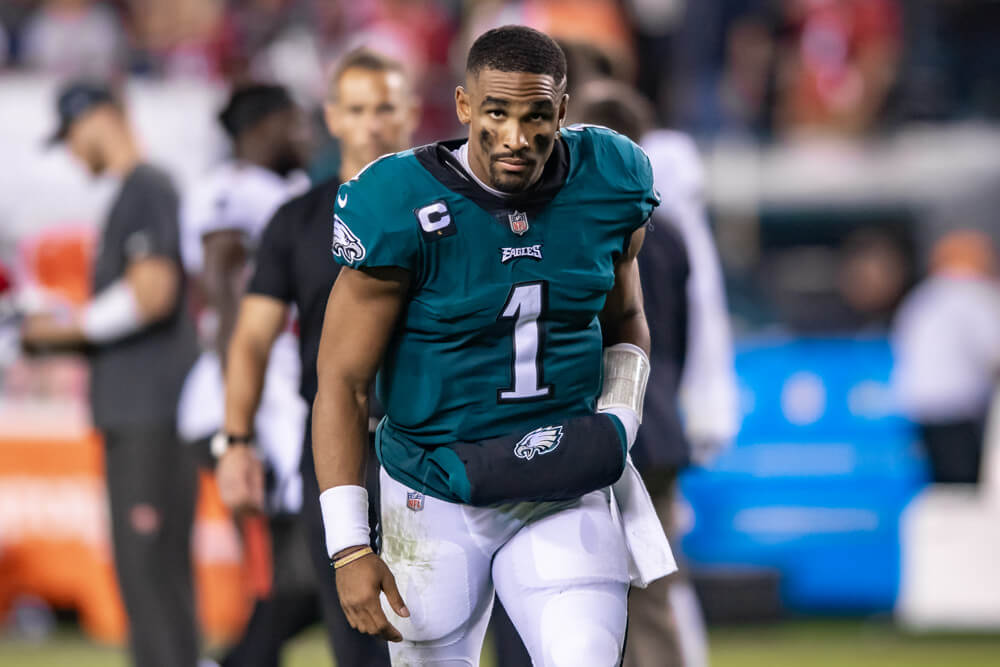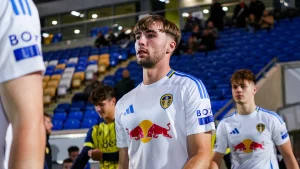
BREAKING NEWS:Jalen hurts questions benchings of young QBs; Lack of patience around NFL……
Breaking News: Jalen Hurts Questions Benchings of Young QBs, Criticizes Lack of Patience in NFL
By [Admin], Sports Correspondent – November 1, 2024
In a recent media interview, Philadelphia Eagles quarterback Jalen Hurts shared pointed remarks about the current treatment of young quarterbacks in the NFL. His comments highlighted a perceived trend of impatience surrounding the development of rookie and second-year quarterbacks. Hurts, who himself faced a challenging journey to starting prominence, expressed concern that teams are benching young signal-callers too quickly, ultimately stunting their potential growth and disrupting team chemistry.
The Perspective of a Young Veteran
Jalen Hurts’ journey to becoming a franchise quarterback offers him a unique lens on this issue. Drafted by the Eagles in the second round of the 2020 NFL Draft, Hurts had to navigate his own share of obstacles, including initial benching, scrutiny over his performance, and doubts about his capabilities. Despite these challenges, Hurts persevered, growing into a Pro Bowl-level player who led the Eagles to the playoffs in successive seasons and the Super Bowl in 2023. Hurts’ own experience has evidently fueled a belief that young quarterbacks can succeed if given the right support, patience, and resources.
During his interview, Hurts pointed out that developing into a reliable starter in the NFL requires time, especially at such a mentally demanding position. “Playing quarterback in this league is tough,” he remarked. “I see these young guys working hard, putting in the hours, learning the schemes, but sometimes, the leash is so short that one bad game, and they’re out.” His comments likely resonate with several young quarterbacks currently in the league, who may feel similarly constrained by the pressures and expectations surrounding them.
A Growing Trend of Rapid Benchings
Hurts’ remarks come amid a growing number of cases where rookie or second-year quarterbacks are benched after struggling to find consistency on the field. Just in the past season, several teams made early quarterback changes that left fans, analysts, and players scratching their heads. Among the most high-profile examples are:
- New England Patriots’ Mac Jones: Despite showing promise early in his career, Jones has been benched repeatedly this season. The revolving door at the Patriots’ QB position has raised questions about the team’s commitment to developing him.
- Houston Texans’ CJ Stroud and Indianapolis Colts’ Anthony Richardson: Though these young quarterbacks have shown considerable talent, they too faced whispers of being “on the hot seat” due to occasional turnovers and missteps, as the league’s patience with young quarterbacks appears increasingly thin.
- Carolina Panthers’ Bryce Young: Selected first overall in the 2023 NFL Draft, Young has struggled to find his footing in Carolina’s offense. Despite his potential, there is already speculation about how long the Panthers will stick with him amid mounting pressures to win.
The trend has drawn concern from players and analysts alike, with some attributing it to a lack of long-term vision within NFL front offices. Hurts hinted that some of these decisions reflect the impatience of organizations looking for instant results rather than sustainable growth.
Short-Term Success vs. Long-Term Development
The NFL has always been a results-driven league. However, the era of social media and instant information seems to have intensified the expectation for quick success, especially at the quarterback position. Teams face immense pressure from fans and media alike, often leading decision-makers to make moves designed for immediate impact instead of fostering long-term development. Hurts pointed out that this trend can be particularly damaging to young quarterbacks still adjusting to the speed and complexity of NFL defenses.
“I was fortunate to be in an organization that believed in me, even when things got tough. They stuck with me, and that’s why I am where I am today,” Hurts noted, likely referencing the Eagles’ decision to keep him as a starter despite early struggles. “You look around now, and it’s like if you’re not Patrick Mahomes from day one, teams are moving on to the next guy.”
This “Mahomes Effect,” as some have dubbed it, has become a double-edged sword. While young quarterbacks are expected to replicate the immediate success of superstars like Mahomes or Justin Herbert, the reality is that few can achieve such results without the same level of support, coaching stability, and skill-position talent. The unfair comparisons can lead to detrimental pressure on young players who are still adapting to the professional game.

Voices from Around the League: A Shared Concern
Hurts’ comments are not unique, as several other NFL veterans and analysts have echoed similar concerns over recent years. Former quarterbacks like Alex Smith, Andrew Luck, and Matt Ryan have discussed the vital role that consistent mentorship and coaching played in their own careers, helping them withstand the pressures and learn the intricacies of their position over time.
Furthermore, some current coaches and general managers are beginning to voice support for Hurts’ stance. Baltimore Ravens head coach John Harbaugh, for example, expressed empathy for young quarterbacks, emphasizing the importance of patience: “It’s a tough job to step into, and when you’re looking over your shoulder constantly, it’s hard to develop confidence.”
Yet, not every organization seems to agree with this approach. Some front offices argue that quick benchings signal accountability and a dedication to winning. But Hurts and others caution that such a “win-now” mentality can erode a team’s culture, replacing the focus on development with constant turnover. Former NFL quarterback Tony Romo, now a top analyst, has commented that this approach creates a “cycle of mediocrity” where teams never settle on a long-term quarterback solution.
What’s the Solution? Hurts’ Call for Change
Hurts believes that a possible solution lies in the adoption of more comprehensive developmental systems similar to those seen in the NBA or MLB. “When you draft a guy in the first or second round, you’re making an investment. Let them grow; let them make mistakes. It’s how we all get better,” Hurts argued.
He suggested that teams could develop quarterback “growth plans” that would include:
- Enhanced Mentorship: Assigning seasoned players or assistant coaches to mentor young quarterbacks could provide the guidance that is often lacking.
- Consistent Coaching: Too often, rookie quarterbacks are brought into systems that change drastically if the head coach or offensive coordinator is replaced. Hurts contends that consistency in coaching is crucial, especially in the early years.
- Realistic Performance Metrics: Rather than measuring success purely by wins, Hurts recommends that young quarterbacks be evaluated based on gradual improvements, understanding that turnovers and mistakes are part of the learning curve.
- Reduced Media Pressure: Finally, Hurts believes that organizations can play a role in tempering expectations. “We all want to win, but if every game turns into a referendum on a young quarterback’s future, how are they supposed to find their footing?”
A Message That Resonates
Jalen Hurts’ call for patience might be well-timed as the NFL grapples with an influx of young talent that needs room to grow. As more rookies are thrust into starting roles, the league is likely to see increased debate over how to best support their growth. Hurts’ message resonates not just with quarterbacks but with players across all positions who are trying to find their place within a fast-paced, high-stakes league.
The question remains: Will NFL teams listen? Hurts’ career stands as a testament to the power of resilience and the payoff that comes with patience. Whether or not his words will shift attitudes in NFL front offices is yet to be seen, but one thing is clear—Hurts has sparked a conversation that could shape the future for the next generation of quarterbacks.





